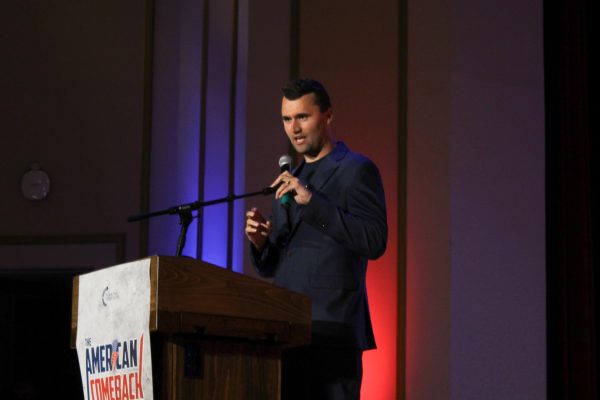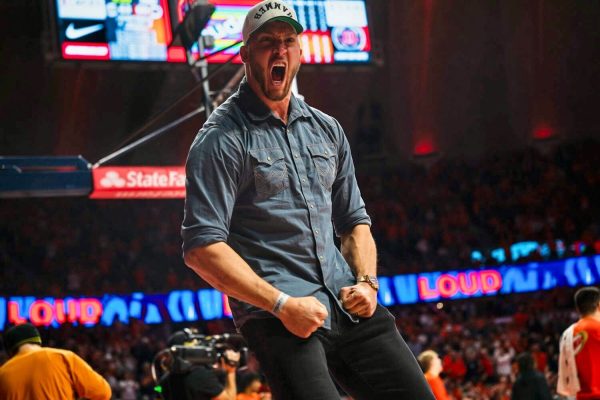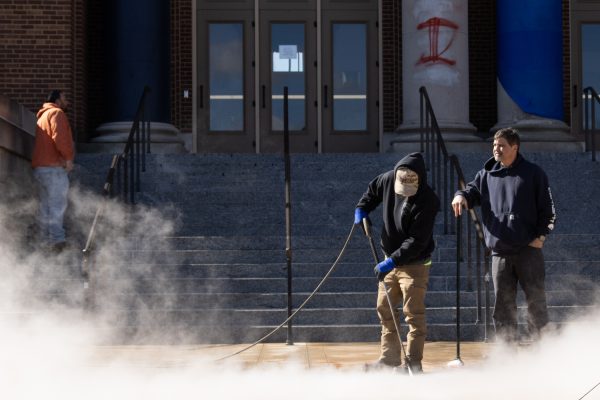The story behind the entree: Escobar’s staff reflects during final year
February 11, 2016
On a cloudy afternoon, a year before the pictures come down and the music goes silent, a year before the bread is finished and the fountain goes quiet, Jeff Bonillabrleaned against the edge of a tall, crème-colored chair in the lounge of his family’s restaurant.
“I spent a lot of time at that bar,” said Bonilla, the restaurant’s manager.
Bonilla looked down at his shoes, which were pressed against the restaurant’s wooden floors. He took a look around the room — noticing the oranges and the blues among the Latin-American hues. It’s one of the restaurants he’s come to know best.
Get The Daily Illini in your inbox!
Escobar’s.
So many memories, so many stories, he described, all contained between these walls.
“You learn something new every day,” he said.
Obdulio and Jane Escobarbr, Bonilla’s parents, recently announced that they would not renew the Latin-American restaurant’s lease at their current location: 6 E. Columbia Ave. in Champaignbr. They told the public that 2016 would be the last year to eat the pupusas, the plantains and the seafood paellabr.
By 2017, after 10 years in operation, the doors will be shut for good.
“It’s hard,” Bonilla said. “It’s a lot of work to run a restaurant and put in 60 hours a week. You don’t make as much as other people working full-time jobs.”
Bonilla has fulfilled about every possible role inside this restaurant — from bussing and waiting to now managing. He looks back on the long hours and the late nights. He was 14 when it opened; he will be 24 when it closes.
“I don’t plan on doing this for the rest of my entire life,” Bonilla said. “When we’re more busy, things get stressful. You have to learn to please people. I could do it, but I need a more stable lifestyle.”
But as he listens to the familiar Latin-American music, he said that just because it’s been a hard 10 years and just because he has other plans, doesn’t mean it will be an easy close.
Because to his stepfather Obdulio Escobar, the restaurant isn’t just important.
It isn’t just his profession.
It saved his life.
The Escobar story
Until the age of 16, Obdulio grew up in the slums of Guatemala. His house had concrete floors. The roof was nonexistent. But even though his living situation was hard, in the grand scheme of things, he had other worries.
The government killed several of his family members. Guerillas harassed his family everyday. When he was a child, the government kidnapped his father for a year and returned him with a broken and infected leg.
At the age of 16, he left the country for Cancun with a boy who was just a few years older than him. They found jobs at a five-star restaurant, and with little-to-no cooking experience, Obdulio started as a dishwasher.
But there was someone he was always watching: the cooks. He scrutinized their every move. He picked up on their techniques. Suddenly, in no time at all, he learned how to cook.
At 17, he came to the United States and met a woman named Jane Anderson in Washington D.C., who offered him a position at her restaurant. At that time, Bonilla said his father could barely speak English. But two years later, he learned the language fluently. He became the restaurant’s head chef, and eventually, he even became the owner’s husband.
To Bonilla, this is just one of the many reasons as to why his father, who is now cooking coconut crème pies in the kitchen, inspires him so much.
“When I was 16, he was like, ‘You’re getting a car, but when I was your age, I was working 60 hours a week.’” Bonilla said. “He’s taught me to be strong. When I’m having a terrible time or am really upset, I remember it can always be worse.”
Learning from his father
Bonilla said this soon-to-be-closed restaurant fulfilled many of Obdulio’s dreams.
“To go from being in the slums of Guatemala to owning multiple restaurants and having what he has now,” Bonilla said. “I think it’s as close as you can get to the American dream.”
The couple, along with Bonilla, moved to the C-U area in September of 1998, and soon after, they opened Milo’s, located in southern Urbana. Bonilla missed the first month of kindergarten that year.
But in 2007, Obdulio wanted to channel his Latin-American roots and create dishes that the customers of Milo’s weren’t accustomed to.
He wanted to do his own thing, Bonilla said.
This cuisine helped Bonilla get closer to his stepfather.
“My real father was an alcoholic. Obdulio is my stepfather technically, but he’s been in my life since 2,” Bonilla said. “A lot of bonding was done over cooking.”
Bonilla remembers beating eggs alongside his father. He remembers washing dishes and rolling silverware. He remembers trying to find excuses just to spend time with him.
“I would pretend to work,” he said. “I would do very simple tasks that didn’t really involve me doing dangerous things.”
But along with the happy memories, there were also fights.
He remembers making mistakes in the kitchen, yelling at his father and crying afterward. Though they were difficult at the time, it’s these moments that taught him the most.
“It says a lot about your character if you fight with someone, or if you don’t hold a grudge,” Bonilla said. “If you apologize right afterward or understand what you did wrong, it’s a growing experience and a bonding moment.”
Escobar’s is located off the beaten path. It’s hidden behind an apartment building and situated a few blocks on the outskirts of downtown Champaign. Bonilla said the lounge doesn’t see nearly as many visitors as other popular bars in the area on a Saturday night. On this overcast afternoon, only three tables are occupied.
Memories within the cuisine
And yet, there are still many visitors who will leave behind memories once these doors shut.
“I hear stories from people who come in. People say, ‘I had my first date here, and now I’m married,’ and other things like that, that really make a huge impact,” Bonilla said. “I didn’t realize how much we had affected the community. I thought we were just here.”
Lisa Powersbr, graduate student at the University, has been visiting the restaurant once a week for four years. Though it’s difficult on her student budget, she makes it a priority.
“Happiness counts for something,” she said.
She said there’s something about Escobar’s that many local restaurants don’t have.
“It’s amazing,” she said. “It’s just perfect. I love the entire menu. It’s never over or under-cooked. A lot of it has to do with the chef. He pays attention to textures and sauces. He can take something as simple as tacos and make it amazing.”
She remembers spending evenings with her boyfriend at the restaurant and plans to spend Valentine’s Day this year at Escobar’s as well.
Though she will already be graduated by the time Escobar’s closes, she said finding another Latin-American restaurant in her new location is a priority.
“I don’t know what I will do,” she said.
For Maya Gouliardbr, one of the restaurant’s five servers, Escobar’s has become a second home.
“You know those shows, kitchen nightmares, when they try to fix everything that was wrong with it? The goal is to be something like this,” she said. “Everyone gets along; people love the food. Every business wants to be like this. It’s nice. It’s a team. Everyone helps.”
Back in the lounge, Bonilla has already made plans for when the restaurant closes.
“I want to go into teaching,” Bonilla said. “I find it fulfilling to help out kids.”
He’s learned a lot from this experience that he can take to this profession.
“You have to be fair; you have to respect everyone,” he said. “You have to be organized. I’m 23 right now, and I feel like I’m 30. Not in terms of my body wearing down, but in terms of my mind.”
Although work inside these warm-colored walls hasn’t been easy, he knows it will be just as hard to let this restaurant, this lounge, this place, all go.
“It’s like my second home,” Bonilla said. “I will miss this a lot.”
spfoste2@dailyillini.com





